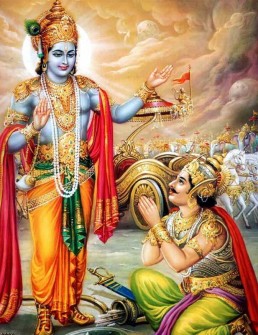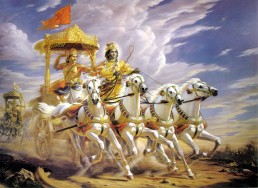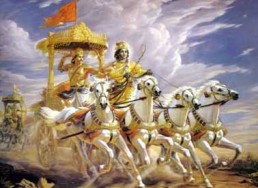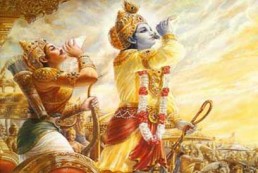Bhagavad Gita-Chapter 15 All Verses with Meaning and Audio
ऊर्ध्वमूलमधःशाखमश्वत्थं प्राहुरव्ययम् ।
छन्दांसि यस्य पर्णानि यस्तं वेद स वेदवित् ॥ १५-१॥
ūrdhvamūlamadhaḥśākhamaśvatthaṃ prāhuravyayam
chandāṃsi yasya parṇāni yastaṃ veda sa vedavit 15-1
गुणप्रवृद्धा विषयप्रवालाः ।
अधश्च मूलान्यनुसन्ततानि
कर्मानुबन्धीनि मनुष्यलोके ॥ १५-२॥
guṇapravṛddhā viṣayapravālāḥ
adhaśca mūlānyanusantatāni
karmānubandhīni manuṣyaloke 15-2
नान्तो न चादिर्न च सम्प्रतिष्ठा ।
अश्वत्थमेनं सुविरूढमूलं
असङ्गशस्त्रेण दृढेन छित्त्वा ॥ १५-३॥
nānto na cādirna ca sampratiṣṭhā
aśvatthamenaṃ suvirūḍhamūlaṃ
asaṅgaśastreṇa dṛḍhena chittvā 15-3
यस्मिन्गता न निवर्तन्ति भूयः ।
तमेव चाद्यं पुरुषं प्रपद्ये ।
यतः प्रवृत्तिः प्रसृता पुराणी ॥ १५-४॥
yasmingatā na nivartanti bhūyaḥ
tameva cādyaṃ puruṣaṃ prapadye
yataḥ pravṛttiḥ prasṛtā purāṇī 15-4
अध्यात्मनित्या विनिवृत्तकामाः ।
द्वन्द्वैर्विमुक्ताः सुखदुःखसंज्ञै-
र्गच्छन्त्यमूढाः पदमव्ययं तत् ॥ १५-५॥
adhyātmanityā vinivṛttakāmāḥ
dvandvairvimuktāḥ sukhaduḥkhasaṃjñai-
rgacchantyamūḍhāḥ padamavyayaṃ tat 15-5
यद्गत्वा न निवर्तन्ते तद्धाम परमं मम ॥ १५-६॥
yadgatvā na nivartante taddhāma paramaṃ mama 15-6
मनःषष्ठानीन्द्रियाणि प्रकृतिस्थानि कर्षति ॥ १५-७॥
manaḥṣaṣṭhānīndriyāṇi prakṛtisthāni karṣati 15-7
गृहीत्वैतानि संयाति वायुर्गन्धानिवाशयात् ॥ १५-८॥
gṛhītvaitāni saṃyāti vāyurgandhānivāśayāt 15-8
अधिष्ठाय मनश्चायं विषयानुपसेवते ॥ १५-९॥
adhiṣṭhāya manaścāyaṃ viṣayānupasevate 15-9
विमूढा नानुपश्यन्ति पश्यन्ति ज्ञानचक्षुषः ॥ १५-१०॥
vimūḍhā nānupaśyanti paśyanti jñānacakṣuṣaḥ 15-10
यतन्तोऽप्यकृतात्मानो नैनं पश्यन्त्यचेतसः ॥ १५-११॥
yatanto’pyakṛtātmāno nainaṃ paśyantyacetasaḥ 15-11
यच्चन्द्रमसि यच्चाग्नौ तत्तेजो विद्धि मामकम् ॥ १५-१२॥
yaccandramasi yaccāgnau tattejo viddhi māmakam 15-12
पुष्णामि चौषधीः सर्वाः सोमो भूत्वा रसात्मकः ॥ १५-१३॥
puṣṇāmi cauṣadhīḥ sarvāḥ somo bhūtvā rasātmakaḥ 15-13
प्राणापानसमायुक्तः पचाम्यन्नं चतुर्विधम् ॥ १५-१४॥
prāṇāpānasamāyuktaḥ pacāmyannaṃ caturvidham 15-14
मत्तः स्मृतिर्ज्ञानमपोहनञ्च ।
वेदैश्च सर्वैरहमेव वेद्यो
वेदान्तकृद्वेदविदेव चाहम् ॥ १५-१५॥
mattaḥ smṛtirjñāna mapohanañca
vedaiśca sarvairahameva vedyo
vedāntakṛd vedavideva cāham 15-15
क्षरः सर्वाणि भूतानि कूटस्थोऽक्षर उच्यते ॥ १५-१६॥
kṣaraḥ sarvāṇi bhūtāni kūṭastho’kṣara ucyate 15-16
यो लोकत्रयमाविश्य बिभर्त्यव्यय ईश्वरः ॥ १५-१७॥
yo lokatrayamāviśya bibhartyavyaya īśvaraḥ 15-17
अतोऽस्मि लोके वेदे च प्रथितः पुरुषोत्तमः ॥ १५-१८॥
ato’smi loke vede ca prathitaḥ puruṣottamaḥ 15-18
स सर्वविद्भजति मां सर्वभावेन भारत ॥ १५-१९॥
sa sarvavidbhajati māṃ sarvabhāvena bhārata 15-19
एतद्बुद्ध्वा बुद्धिमान्स्यात्कृतकृत्यश्च भारत ॥ १५-२०॥
ॐ तत्सदिति श्रीमद्भगवद्गीतासूपनिषत्सु
ब्रह्मविद्यायां योगशास्त्रे श्रीकृष्णार्जुन संवादे
पुरुषोत्तमयोगो नाम पञ्चदशोऽध्यायः ॥ १५॥
etadbuddhvā buddhimānsyāt kṛtakṛtyaśca bhārata 15-20
oṃ tatsaditi śrīmadbhagavadgītāsūpaniṣatsu
brahmavidyāyāṃ yogaśāstre śrīkṛṣṇārjuna saṃvāde
puruṣottamayogo nāma pañcadaśo’dhyāyaḥ 20

Description
Bhagavad Gita Chapter 15 Summary
Puruṣottama-Yoga – The Yoga of the Ultimate Person
Verses 1 – 3
Description of saṃsāra
Verses 3 – 6
Means of liberation
Verses 7 – 11
Brahman as jīva
Verses 12 – 15
Brahman as jagat
Verses 16 – 18
Brahman as puruṣottama
Verses 19 – 20
Glory of puruṣottama-jñānam
Gita Chapter 15 – Commentary by Swami Paramarthananda
Background
In the 13th and 14th chapters, the Lord dealt with the main theme of the Gītā — the essential oneness of jīva and Īśvara. Being a subtle topic, Krishna discusses the same in this chapter also, in a different way.
In the first two and a half verses, Krishna gives a description of the vast and endless saṃsāra by comparing it with the mighty aśvattha-tree. Like this tree, this saṃsāra is vast, many-branched, well-rooted and not easily destructible. To add to this is its mysterious nature. (The jīva is caught in this saṃsāra, helplessly struggling to free itself.)
In the next two and half verses (upto the 5th), Bhagavān talks about the means to get out of this saṃsāra. The first step is to develop detachment from this saṃsāra by recognizing its binding nature. (As long as one has value for worldly pursuits, one’s mind will not be available for seeking freedom.) Having withdrawn the mind from worldly desires, one should seek Brahman, the cause of everything (4). (Seeking Brahman is nothing but jñānayoga — vedantic enquiry under a guru.) Then, Krishna highlights the qualifications necessary for this knowledge. Freedom from (reaction towards) the pairs of opposites, pride, delusion, and attachment as well as a commitment to vedantic enquiry are emphasized here (5).
In the 6th verse, the Lord talks about the nature of Brahman. It is not illumined by anything (because it is the self-effulgent consciousness which illumines everything). Attaining this Brahman, the supreme abode of the Lord, one does not return to saṃsāra again.
[In the following sections, Krishna reveals that Brahman alone expresses in the form of jīva and jagat (universe). From this it becomes clear that reaching Brahman does not involve travel.]
From the 7th to the 11th verse, Krishna shows that the jīva, the consciousness in every being, is the Lord’s (Brahman’s) expression only (7). At the time of death, this jīva alone takes the mind and sense organs from one body to another body. (8). It is this jīva who experiences everything through the sense organs (9). Thus, the Lord alone is expressing in the form of the very life and its functions in every being (10). The pure minded ones recognize this whereas the deluded ones do not (11).
From the 12th to the 15th verse, Krishna shows how the jagat (the universe) also is an expression of the Lord (Brahman). The light in the sun, the moon, and the fire is the Lord only (12). In the form of the sunlight and moonlight, the Lord alone sustains all living beings (13). As the digestive fire, it is the Lord who digests the food (14). The Lord alone is behind all the mental faculties of knowledge, memory, etc. He is the author and the content of the Vedas as well as the knower of the Vedas (15).
(Thus, Krishna reveals that Brahman alone is in the form of jīva and jagat. Hence reaching Brahman is in the form of understanding only — understanding that Brahman is never away from either oneself or the universe.)
In the next three verses, Bhagavān reveals Brahman in its true nature. Brahman, in the form of the manifest universe, is called kṣarapu-ruṣa. As the unmanifest universe (māyā), the same Brahman is called akṣarapuruṣa (16). Both these puruṣas are relative. Beyond these two puruṣas is the uttamapuruṣa, the absolute. Because of its superiority, it is called paramātmā or puruṣottama. It is the imperishable (attributeless) Brahman because of which everything exists (17, 18).
Concluding the teaching, Krishna glorifies this knowledge as the means of fulfillment. With an undeluded mind, the one who knows this most secret knowledge of puruṣottama, becomes the knower of all and a person of fulfillment (19, 20).
Gita 15th Chapter – Main Points
Description of saṃsāra: 1 to 3
Means of liberation: 3 to 6
Brahman as jīva: 7 to 11
Brahman as jagat: 12 to 15
Brahman as puruṣottama: 16 to 18
Glory of puruṣottama-jñānam: 19, 20
Since the main topic of this chapter is puruṣottama, this chapter is called Puruṣottama yoga.
Other Bhagavad Gita Shlokams
Bhagavad Gita
The Bhagavad Gita, or the Song of the Lord, is a dialogue between Krishna, an incarnation of Vishnu, and his friend and disciple, Arjuna. Composed of 701 Shlokas arranged in 18 chapters, the Gita is one of the best-known philosophical texts of…
Bhagavad Gita-Chapter 01 All Verses with Meaning and Audio
Bhagavad Gita Chapter 1 All Verses for easy chanting along with Audio and Meaning. Lyrics In English, Sanskrit, Hindi, Telugu, Tamil, Gujarati, Bengali and many more languages.
Bhagavad Gita-Chapter 02 All Verses with Meaning and Audio
Bhagavad Gita Chapter 2 All Verses for easy chanting along with Audio and Meaning. Lyrics In English, Sanskrit, Hindi, Telugu, Tamil, Gujarati, Bengali and many more languages.
Bhagavad Gita-Chapter 03 All Verses with Meaning and Audio
Bhagavad Gita Chapter 3 All Verses for easy chanting along with Audio and Meaning. Lyrics In English, Sanskrit, Hindi, Telugu, Tamil, Gujarati, Bengali and many more languages.
Bhagavad Gita-Chapter 04 All Verses with Meaning and Audio
Bhagavad Gita Chapter 4 All Verses for easy chanting along with Audio and Meaning. Lyrics In English, Sanskrit, Hindi, Telugu, Tamil, Gujarati, Bengali and many more languages.
Bhagavad Gita-Chapter 05 All Verses with Meaning and Audio
Bhagavad Gita Chapter 5 All Verses for easy chanting along with Audio and Meaning. Lyrics In English, Sanskrit, Hindi, Telugu, Tamil, Gujarati, Bengali and many more languages.
Bhagavad Gita-Chapter 06 All Verses with Meaning and Audio
Bhagavad Gita Chapter 6 All Verses for easy chanting along with Audio and Meaning. Lyrics In English, Sanskrit, Hindi, Telugu, Tamil, Gujarati, Bengali and many more languages.
Bhagavad Gita-Chapter 07 All Verses with Meaning and Audio
Bhagavad Gita Chapter 7 All Verses for easy chanting along with Audio and Meaning. Lyrics In English, Sanskrit, Hindi, Telugu, Tamil, Gujarati, Bengali and many more languages.
Bhagavad Gita-Chapter 08 All Verses with Meaning and Audio
Bhagavad Gita Chapter 8 All Verses for easy chanting along with Audio and Meaning. Lyrics In English, Sanskrit, Hindi, Telugu, Tamil, Gujarati, Bengali and many more languages.
Bhagavad Gita-Chapter 09 All Verses with Meaning and Audio
Bhagavad Gita Chapter 9 All Verses for easy chanting along with Audio and Meaning. Lyrics In English, Sanskrit, Hindi, Telugu, Tamil, Gujarati, Bengali and many more languages.
Bhagavad Gita-Chapter 10 All Verses with Meaning and Audio
Bhagavad Gita Chapter 10 All Verses for easy chanting along with Audio and Meaning. Lyrics In English, Sanskrit, Hindi, Telugu, Tamil, Gujarati, Bengali and many more languages.
Bhagavad Gita-Chapter 11 All Verses with Meaning and Audio
Bhagavad Gita Chapter 11 All Verses for easy chanting along with Audio and Meaning. Lyrics In English, Sanskrit, Hindi, Telugu, Tamil, Gujarati, Bengali and many more languages.
Bhagavad Gita-Chapter 12 All Verses with Meaning and Audio
Bhagavad Gita Chapter 12 All Verses for easy chanting along with Audio and Meaning. Lyrics In English, Sanskrit, Hindi, Telugu, Tamil, Gujarati, Bengali and many more languages.
Bhagavad Gita-Chapter 13 All Verses with Meaning and Audio
Bhagavad Gita Chapter 13 All Verses for easy chanting along with Audio and Meaning. Lyrics In English, Sanskrit, Hindi, Telugu, Tamil, Gujarati, Bengali and many more languages.
Bhagavad Gita-Chapter 14 All Verses with Meaning and Audio
Bhagavad Gita Chapter 14 All Verses for easy chanting along with Audio and Meaning. Lyrics In English, Sanskrit, Hindi, Telugu, Tamil, Gujarati, Bengali and many more languages.
Bhagavad Gita-Chapter 16 All Verses with Meaning and Audio
Bhagavad Gita Chapter 16 All Verses for easy chanting along with Audio and Meaning. Lyrics In English, Sanskrit, Hindi, Telugu, Tamil, Gujarati, Bengali and many more languages.
Bhagavad Gita-Chapter 17 All Verses with Meaning and Audio
Bhagavad Gita Chapter 17 All Verses for easy chanting along with Audio and Meaning. Lyrics In English, Sanskrit, Hindi, Telugu, Tamil, Gujarati, Bengali and many more languages.
Bhagavad Gita-Chapter 18 All Verses with Meaning and Audio
Bhagavad Gita Chapter 18 All Verses for easy chanting along with Audio and Meaning. Lyrics In English, Sanskrit, Hindi, Telugu, Tamil, Gujarati, Bengali and many more languages.
Gita Dhyanam
The Gītā Dhyānam, also called the Gītā Dhyāna or the Dhyāna Ślokas associated with the Gītā, is a 9-verse Sanskrit poem that has often been attached to the Bhagavad Gita, one of the most important scr
Bhagavad Gita-Chapter 15 All Verses with Meaning and Audio – Bhagavad Gita – Bhagavad Gita Chapter 15 All Verses Easy Chanting with Audio and Meaning, Lyrics



